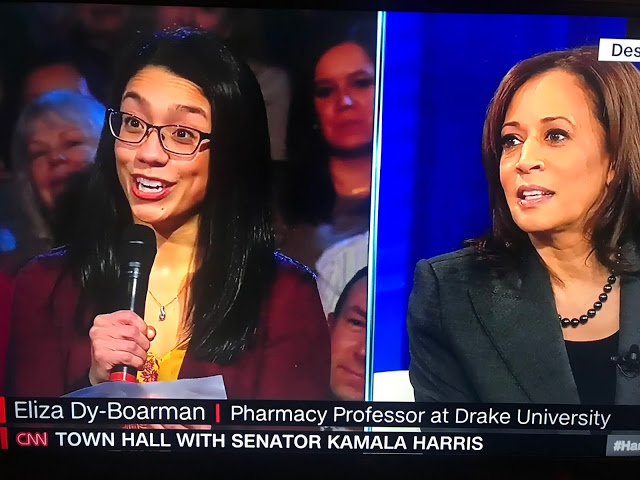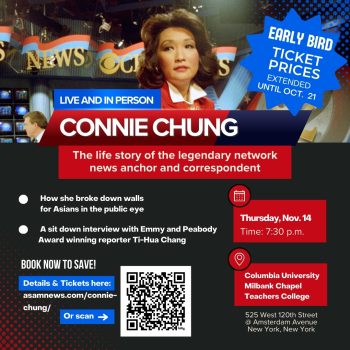
A Filipina American professor was able to ask a question about Sen. Kamala Harris’ heritage during this week’s town hall in Des Moines, Iowa on CNN, but the Senator chose not to acknowledge her Indian background.
Towards the end of town hall, Eliza Dy-Boarman, a Pharmacy Professor at Drake University, asked her question of the presidential candidate (starts at 50:06).
Eliza Dy-Boarman: Hi, Senator Harris. I’m the proud daughter of a Filipino immigrant and I know you also share immigrant roots. How did the aspect of this upbringing shape your character and how might this perspective be useful to you as you peruse for the United States presidency?
Sen. Kamala Harris: Thank you for that question. You know, my parents came here believing in a dream. It’s a dream they had for themselves, a dream they had for their daughter, my sister and me. It’s a dream of living in a way about freedoms, about equality, about the ability to pursue one’s passions.and contribute to their community and to their society. And that in many ways has informed the way I think about my country. I love my country. I love my country. And one of the reasons is that we are a country founded in noble ideals. we were founded on the ideals that are behind the writing of the Constitution of the United States and its amendments, the Bill of Rights the Declaration of Ind. those words spoken in 1776 – that we are all and should be treated as equal. I believe in those ideals. I also know we have not achieve those ideals. I know that. But, part of the strength of who we are is that we say we will fight for those ideals. We are aspirational by nature. And one of the reasons I am running for president of the United States, is because I know and I am prepared to fight to fight for those ideals, especially if they are under attack; especially when we have an administration that does not understand that we honor a free press (applause), that we honor freedom of association, that we honor the belief that all people are equal and should be treated that way. But truly, my background in terms o what my parents believed and what they instilled in us is what has formed so much of what I think about my country. And why I love my country.
There it was! Dy-Boarman started her question, “I’m the proud daughter of a Filipino immigrant …” – the perfect lead-in for Harris to respond in kind, “I , too, am the proud daughter of an Indian immigrant ….” but she didn’t.
It was a softball question and Harris should have knocked it out of the ball park by giving the senator an opportunity to claim her mixed heritage as the daughter of a mother from India and a father from Jamaica. If she had only mentioned that she is half-Indian it would have been a more satisfactory answer for many AAPI viewers.
That sort of public acknowledgement of her roots, would go a long way to quiet people in in the AAPI community who have not fully embraced Harris because of her apparent hesitancy to say publicly that her mother is from India; that her middle name is Devi, that she spent summers in India.
In a New York Timesoped, Harris did not hesitate to talk about her mother, who had a strong impact on her life and viewpoints.
We understand the political need for Harris to identify more strongly with the African American community; that Harris grew up amidst the Black community in Berkeley and Oakland, Calif.; and that she chose to attend Howard University, one of the historically Black institutions of learning — but it wouldn’t hurt that once in while, she would say — loud and clear, without any hedging — that she is half-Asian.
Harris – for the most part – was well prepared in answering the questions put forth by the Iowans. The first question about race, she knocked out of the ballpark. “Let’s speak truth … racism still exists.”
She was also asked about her feelings of the possibility of being the first Black woman president (again, she failed to mention her other half).
Her response to what to do about the participants in the Deferred Arrival of Childhood Arrivals (DACA) program was one her best of the night. “We (America) made a promise” that was broken by the current administration.
Even the question about her role as San Francisco’s District Attorney and California’s Attorney General that questioned her image as a progressive was well-memorized, citing all the reforms that she instituted in those roles.
It’s very early in the presidential campaign and Harris (and the other candidates) still have time to hone their messages and I expect that she will correct some of these early miscues.
Harris’ Des Moines town hall was one day after she officially launched her campaign for 2020 in a rally held in her hometown of Oakland, California in front of a crowd of 20,000; and a little more than a year before the Iowa Caucus, the first Primary vote for Democrat delegates.
AsAmNews has Asian America in its heart. We’re an all-volunteer effort of dedicated staff and interns. Check out our Twitter feed and Facebook page for more content. Please consider interning, joining our staff or submitting a story.



RE Is Kamala Harris Downplaying Her Indian Roots: I don’t think she is down playing her Jamaican or Indian heratage. I think just doesn’t want it to be a focus. You do remember the “birther’ situation with President Obama. I think she wants us to focus on not who she is but what she wants to do. Just my humble opinion